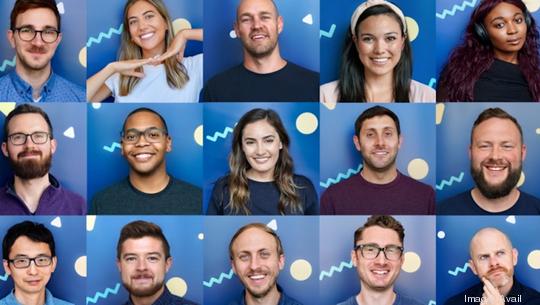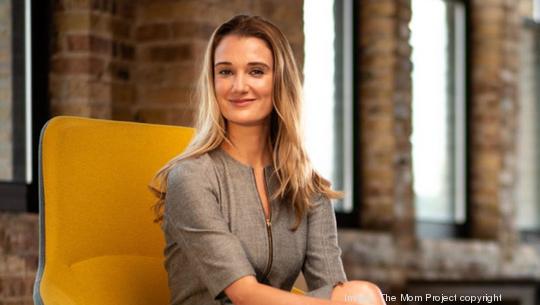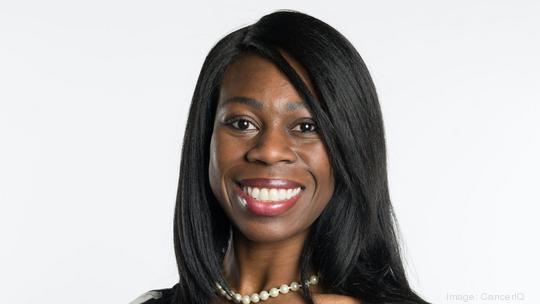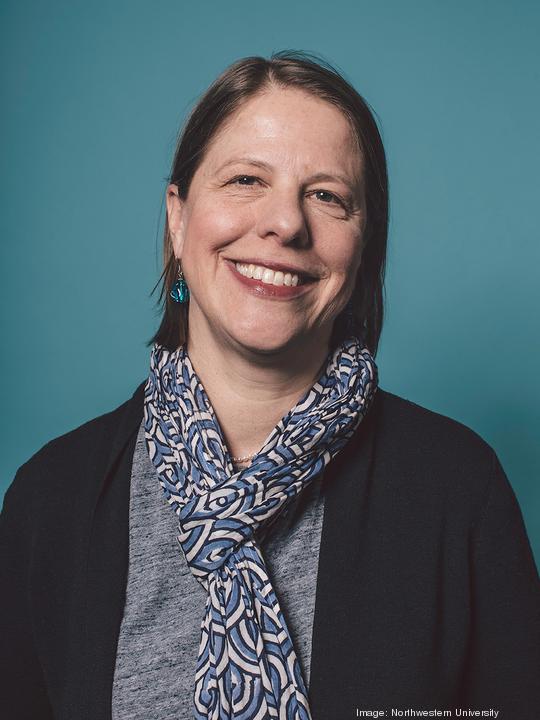2020 has been an unprecedented year. Nearly every person, business and startup has been forced to adapt throughout the Covid-19 pandemic, which is proving to be one of the most challenging periods in modern history.
Every year, Inno recognizes the 50 people and companies that are innovating, growing and thriving in Chicago's tech and startup scene, and this year is no different. Building a company is never easy, but it is most certainly more challenging during a pandemic. The tech companies and startups on our list this year are being recognized for their resilience, dedication and success despite the adversity presented by the pandemic.
So, what exactly makes a company or individual on fire? Inno recognizes people and companies that have had a banner year—whether that’s new funding, recent product launches, big hires, and of course, innovative approaches to addressing the Covid-19 pandemic. The companies on the list span from early-stage growth companies to some of Chicago's biggest tech pillars. Winners are organized into seven categories, including B2B, B2C, Fintech, Food, Health Care, Lifestyle and Supporters.
Winners were sourced by nominations and selected by the Chicago Inno editorial team. In the coming weeks, we’ll spotlight a few of these companies in stories and in our newsletter, The Beat.
To help celebrate this year's winners, Inno invites you and your team, friends, family—and anyone interested or invested in Chicago startups—to join us for our Inno on Fire virtual event on Nov. 5. At the event, we’ll announce the seven Inno Blazers, the top-performing companies from each category that are chosen by a panel of esteemed judges. RSVP to the event here.
Now, without further ado, here are Chicago Inno's 2020 Inno on Fire.
B2B
Alberto Peralta, principal engineer and CTO contributor at NuCurrent: In his role, Peralta is NuCurrent’s lead inventor, holding more than 70 international patents, including inventions for multi-layer substrate based antennas. NuCurrent, a Chicago startup developing antennas for wireless technology like phone chargers, has raised more than $11 million to date, according to Crunchbase.
Arturo: The tech company, which was one of Inno's 20 Chicago startups to watch in 2020, uses artificial intelligence and deep learning to create satellite, aerial, drone and ground-level images that allow real estate professionals to accurately assess physical property characteristics. In April, Arturo raised $8 million in a Series A round led by Crosslink Capital, an early-stage VC firm in San Francisco. Arturo’s tech is based on research started in 2017 at AmFam’s data science and analytics lab to simplify the decision-making processes for insurers, lenders, investors and property managers in the real estate industry. Arturo says its tech can generate detailed property information in under five seconds.
Avail: Founded in 2012 under its previous name Rentalutions, Avail makes software for part-time, do-it-yourself landlords. Avail’s online platform allows landlords to more easily screen tenants, collect rent and manage maintenance requests. On the tenant side, Avail allows renters to apply for an apartment, sign a lease and pay rent online. The tech company said it is seeing significant growth amid the pandemic as more landlords look for ways to provide contactless rent payments, with more than 600,000 landlords and renters now using its platform. In July, the company closed a $4.2 million Series A round to continue growing.

Cohesion: This Chicago startup is working on technology to power the smart buildings of the future and has been catching the attention of big-name investors. Cohesion, which makes a SaaS platform for building managers, raised $6.5 million in a seed round from Hyde Park Angels, Ken Griffin, the founder and CEO of Citadel, and Michael Sacks, the CEO and chairman of GCM Grosvenor, among other investors. Earlier this month, Cohesion announced it launched in Singapore, its first market in Asia.
Forager: This company helps companies with international shipping and has grown significantly in 2020. Forager has developed a cross-border freight solution that makes it easier for shippers to transport products to and from Mexico and Canada. Its product, SCOUT by Forager, allows companies to book, track, and manage any load between the U.S., Mexico and Canada. Earlier this year, Forager raised a $10 million Series A round led by U.S. Venture Partners, a Silicon Valley venture firm that counts Box, HotelTonight and Trunk Club among its previous investments. The funding brought Forager’s total outside capital raised to $14.5 million.
Fyllo: The Chicago startup, which sells a suite of software for data, media and compliance solutions built for the complexities of highly-regulated cannabis industries, started 2020 off with an acquisition. Fyllo purchased Denver cannabis startup CannaRegs for $10 million. Soon after, Fyllo hired Buddy Media co-founder Jeff Ragovin as its first chief commercial officer. And in August, Fyllo raised $10 million in Series A2 financing, bringing its total funding to $26 million.
LanzaTech: This year, Skokie-based renewable energy startup LanzaTech launched a new subsidiary focused on producing sustainable aviation fuel with the help of a $50 million cash infusion. The spinout, called LanzaJet, is constructing a plant in Soperton, Georgia, that will produce 10 million gallons per year of sustainable aviation fuel and renewable diesel for the commercial market. Besides making renewable jet fuel, LanzaTech’s technology also turns waste into chemical feedstock and other chemicals that can be used to build plastics.
Leaf Trade: In one year, Leaf Trade, a Chicago startup that’s building enterprise software for cannabis dispensaries and growers, grew from three employees to 22, went from four markets to 16 and counting, and went from being entirely VC-funded to generating millions in new revenue streams. Leaf Trade, founded in 2017 by CEO James Yi, connects dispensaries with cultivators to purchase cannabis products. At the end of last year, Leaf Trade raised $4.5 million in a round led by Hyde Park Angels and Duke Software Investments.

LogicGate: LogicGate works with companies in financial services, health care, retail and other industries, helping them with things like regulatory compliance, risk management and GDPR compliance. The Techstars grad raised a $24.75 million Series B round this year. It also brought on Emily Heath, the chief trust and security officer at DocuSign, to its board.
NanoGraf: Founded in 2012 and formerly known as SiNode Systems, NanoGraf makes powerful, patented lithium-ion batteries, a product initially developed at Northwestern University and Argonne National Laboratory. Over the summer, it landed a $1.65 million grant from the U.S. Department of Defense to develop longer-lasting batteries to power military equipment.
Rheaply: Right before the Covid-19 pandemic hit, Rheaply, a Chicago startup helping organizations find ways to recycle unused items, closed a $2.5 million round of funding. Soon after, Rheaply’s innovative platform became key in coronavirus relief efforts. Rheaply partnered with the City of Chicago to help source personal protective equipment (PPE) for local nonprofits and businesses, such as hand sanitizer, masks and protective barriers. Rheaply was also named one of Inno’s Crisis Innovators earlier this year.
ShipBob: As one of Chicago’s most notable logistics startups, ShipBob helps small companies ship their products more efficiently. To support its growth, the startup raised $68 million in a Series D round of funding in September. ShipBob says it currently has 10 fulfillment centers across the United States, Canada and Europe. The company opened six new fulfillment centers since April, including two international locations, and it expects to open two more U.S. facilities in the fourth quarter, and another 10 facilities across North America, Europe, Asia and Australia in 2021.
Sprout Social: This Chicago startup, which makes a social media management platform, had an especially big year—it went public on the stock market. In December, Sprout Social began trading on the Nasdaq after pricing its shares at $17, which was the midpoint of its range of $16 to $18, and sold 8.8 million shares, raising $150 million. Since going public, the company’s stock has slowly gained value, trading at about $38 as of press time.
Threekit: Threekit, a Chicago startup that helps brands make 3D and augmented reality configurations for furniture and other products, launched a new AR tool for online shopping in April. The feature allows shoppers to see and customize millions of product variations in augmented reality, which is essential as people shop from home amid the Covid-19 pandemic. In May, Threekit named Matt Gorniak, a co-founder of Chicago startup G2 and a former Salesforce executive, its first CEO. Gorniak most recently served as chief revenue officer at G2, a company he helped launch alongside serial entrepreneur Godard Abel. Abel led a $10 million strategic seed investment in Threekit in 2019.
Vadim Vladimirskiy, CEO at Nerdio: Vladimirskiy founded Nerdio in 2016 and has grown it into a business that helps companies utilize Microsoft Azure public cloud services. Nerdio has seen triple-digit growth year-over-year in both its number of customers and revenue over the last two years. As a direct result of Vadim’s direction and leadership, Nerdio's monthly recurring revenue has grown by more than 200% from August 2019 to July 2020. Additionally, Nerdio went from being deployed in two countries to over 50, securing thousands of partners operating at the international level. In February, Nerdio raised $8 million in a Series A round led by Chicago VC firm MK Capital.
B2C
Cameo: Even though Cameo appeared on last year’s Inno on Fire list, the company had such a dynamite 2020 that it qualified for the list two years in a row. Despite the Covid-19 pandemic, Cameo has seen significant growth and 2020 revenue is on track to hit $100 million. The celebrity shout out service also rolled out a new feature that allows users to book Zoom calls with celebrities, and it’s helping Joe Biden fundraise for his 2020 presidential campaign.

Foxtrot: This year, Foxtrot made a commitment to double down on physical retail stores and raised $17 million to bring its corner stores and cafes to more cities. Foxtrot launched in 2013 as an online-only food and alcohol delivery service. But the startup quickly found that brick-and-mortar stores could serve not only as warehouses for online fulfillment, but also bustling centers for neighborhood shopping. Foxtrot now has seven retail stores in Chicago and two in Dallas, where it sells everything from craft beer, wine, gifts and everyday essentials, along with offering coffee and prepared foods.
Greenlight Planet: A solar startup with roots at the University of Illinois, Greenlight Planet raised $90 million this year to sell electricity kits to people in sub-Saharan Africa and South Asia. The startup makes solar-powered, pay-as-you-go electricity kits, which include home lighting, mobile phone chargers, radios, televisions and fans, as well as the solar panels and batteries to power those appliances. Greenlight says it has sold more than 13 million Sun King products, reaching about 60 million people across 65 countries, and expanding at a rate of over 65,000 new rooftop solar installations per month.
Kin Insurance: Founded in 2016, Kin's insurance platform allows it to make underwriting decisions quickly based on data from satellite images, public records and other sources. Kin sells insurance directly to homeowners, rather than through outside agents, and has piloted its product in Florida---where many homeowners experience inclement weather. Kin launched its flood insurance product earlier this year, which can help up to 77% of Florida homeowners save more than they would with a National Flood Insurance Program policy, Kin says. Kin has also doubled the size of its team in the last year, hiring 80 people so far in 2020, bringing its total headcount to 150. The fast-growing startup raised a $35 million Series B round led by Commerce Ventures, and now has raised $86 million to date.
The Mom Project: Over the last year, The Mom Project raised $25 million in venture capital funding, brought on Serena Williams as an advisor and acquired another startup. The Mom Project, founded in 2016, has built an online platform that helps to connect viable female candidates to employers. Through the pandemic, The Mom Project has honed in on its mission to help women get jobs in a struggling economy. In April, the startup launched the Stronger Together Fund, a $500,00 initiative that will provide grants to small businesses that have been hit hard during the Covid-19 pandemic. The Mom Project also launched an initiative to provide technology certificate scholarships to 10,000 women of color over the next three years to address what it calls a “dramatic backslide” in workplace equality due to pandemic.

Fintech
ChangEd: This Chicago startup that’s helping people pay off their student loans hit a big milestone this year, sending $10 million worth of payments on behalf of its clients. ChangEd, founded in 2016 by brothers Dan Stelmach and Nick Sky, charges users $1 per month to use its app-based service, which collects spare change from everyday purchases and directs it to paying down users’ student debt. Over the last year, ChangEd has doubled its user base and is now managing more than $2 billion of student loans. In 2018, ChangEd users paid down $2 million worth of student loan payments. In 2019, that figure topped $4 million, and this year it has so far exceeded $10 million.
Clearcover: Founded by CEO Kyle Nakatsuji, a former VC at American Family Insurance, Clearcover has built a platform that makes car coverage cheaper by making operations, marketing and distribution more cost effective, and then passes along the savings to customers in the form of lower-cost, higher-quality car insurance. Earlier this year, Clearcover raised its third round of funding, closing on $50 million, bring its total funding to more than $104 million since its founding in 2016.
M1 Finance: Despite the Covid-19 pandemic and the economic slump that's come with it, M1 Finance had a record year of business growth and milestone achievements in 2020. The startup, which offers a no-fee investing app that offers users an automated brokerage, portfolio lines of credit and digital banking, reached $1 billion in assets on its platform. And by September, the startup surpassed $2 billion in assets. M1's growth was supported by a $33 million funding round in June, bringing its total venture funding raised to $54 million. But that number is far less than some of M1's largest competitors, such as Betterment, Wealthfront, Acorns and Stash, which have all raised at least $200 million. Now, more than 200,000 customers currently have an M1 account and over 230,000 trades are processed each day. M1 Finance has 60 employees.
NextLevel: Founded in 1996, NextCapital's platform allows financial firms to provide individualized advice to their customers on things like their 401(k), IRA and taxable brokerage accounts. Last November, the company crossed over $2 billion in assets on its IRA rollover platform. And this September, it raised $30 million, bringing its total funding to $85 million.
Food
Chowbus: Among the highly competitive field of food delivery companies, Chowbus is growing fast with its platform that specializes in bringing authentic Asian cuisine to your door. Amid the Covid-19 pandemic, Chowbus has seen a major uptick in business. The startup says it has increased its revenue 700% year-over-year and has grown its headcount by 300%. To help support its growth, Chowbus raised $33 million in a Series A round led by Silicon Valley VC firm Altos Ventures and NYC-based Left Lane Capital.
Cooler Screens: The day the Inno on Fire list was published, Chicago startup Cooler Screens announced it raised $80 million in venture capital funding. Cooler Screens has developed digital screens that replace traditional cooler doors at retail locations to show shoppers what’s inside refrigerators and let marketers serve targeted ads to customers. The 2-year-old Chicago-based company said it's now raised a total of more than $100 million. Earlier this year, Cooler Screens revealed that it was expanding its partnership with Walgreens and bringing its digital doors to thousands of new locations.
Farmer’s Fridge: Like many businesses, Farmer’s Fridge had to figure out how to survive in a Covid world, where people aren’t in the office to buy lunch out of the company’s vending machines. As the virus overwhelmed hospitals and put America’s doctors and nurses on the frontlines of the fight, health care workers faced a pressing need: access to quick, healthy meals. To meet the occasion, Farmer’s Fridge shifted its focus to hospitals, putting machines in more than 140 facilities in places like Chicago, New York, New Jersey and Indianapolis. In May, the company said it was serving more than 30,000 meals per week to health care workers. Farmer’s Fridge was also named one of Inno’s Crisis Innovators earlier this year.

Grubhub: The Chicago food delivery company was the center of one of the biggest stories in the last year. Grubhub and Netherlands-based Just Eat Takeaway.com agreed to merge in June, creating the largest online food delivery company outside of China. The all-stock deal valued Grubhub at $7.3 billion.
Nature’s Fynd: Previously known as Sustainable Bioproducts, Nature’s Fynd has developed a fermentation process to produce lab-grown, edible protein products that mimic chicken nuggets and cream cheese. Earlier this year, the company raised $80 million in a Series B round led by Generation Investment Management and Breakthrough Energy Ventures, a $1 billion fund led by Bill Gates that aims to invest in companies that are combating climate change, the company announced Tuesday. Breakthrough’s other investors include Jeff Bezos, Michael Bloomberg and Richard Branson. Much of the funding is being used to support work happening at Nature's Fynd’s new 35,000-square-foot manufacturing facility on the Union Stockyards site on the South Side of the city.
Tovala: As consumers look for convenient meal options during the coronavirus crisis, Tovala's smart oven and meal delivery service has been in hot demand. To support its growth, Tovala raised a $20 million Series B round this year led by Finistere Ventures, an agtech-focused VC firm that's backed food startups like Farmer’s Fridge and Memphis Meats. Founded in 2017, Tovala created a countertop oven that scans the barcode of a Tovala meal or other brand-name grocery items to know how exactly to cook the meal. The oven uses a combination of steam, baking and broiling to cook "restaurant-quality" meals in under 20 minutes.
Health Care
Abbott Labs' ID NOW: By the end of March, North Chicago-based Abbott Labs had created a coronavirus test that could produce results in as little as five minutes. Abbott said at the time that it was the fastest available molecular point-of-care test that could detect the coronavirus. It received emergency authorization from the U.S. Food and Drug Administration, and was lauded by officials including Gov. J.B. Pritzker and President Donald Trump. The device, called ID NOW, weighs just 6.6 pounds and is roughly the size of a small toaster. The portable device has been used in urgent care clinics, hospital emergency departments and physicians' offices, and Abbott has shipped ID NOW tests to all 50 states.
Azul 3D: Like many other companies, Azul 3D pivoted to begin making PPE for the Covid-19 pandemic. Azul 3D, which manufactures 3D printers to quickly print highly-customizable structures, began using its tech to produce medical face shields. Since launching, Azul 3D has raised $12.5 million.
CancerIQ: This Chicago startup, which helps health care providers identify patients who have a genetic predisposition to certain cancers, raised $4.8 million in new funding over the summer, bringing its total funding to more than $8 million. The funding is significant in that it not only is fueling CancerIQ's growth, but it's also one of the largest rounds raised by a Black founder in Chicago in recent memory. Led by Feyi Olopade Ayodele, CancerIQ created a risk assessment questionnaire that patients can complete in the waiting room that can identify patients who are at high-risk for certain cancers.

Glen Tullman, founder and executive chairman of Livongo: In the last year, Tullman led his health care tech company Livongo Health to one of its biggest accomplishments to date. Livongo Health was acquired by Teladoc Health, a telemedicine provider, in an $18.5 billion deal, and the combined company is expected to do $1.3 billion in revenue this year. In 2019, Livongo executed a successful initial public offering event, raising about $400 million with its stock price rising nearly 40%. Livongo makes a blood glucose monitor and digital dashboard to help people manage diabetes and other chronic health conditions.
Higi: Founded in 2012, Higi creates self-screening health stations that measure a person's blood pressure, pulse, weight, BMI, body composition and hydration for free. Higi operates more than 10,000 kiosks, which are FDA-cleared and located primarily in grocery and drug stores. This year, Higi landed $30 million in venture capital funding to expand its footprint.
Level Ex: Right before the pandemic hit, Level Ex was making big moves—literally. The startup, which makes video games for physicians to learn medical skills, moved into a 20,000-square-foot office in the Loop and added an ex-Amazon executive as its first chief technology officer. It now employs more than 100 people. Once Covid-19 landed in Chicago, the startup pivoted slightly and launched new offerings aimed at educating users on Covid-19. The new games were built with the support of an educational grant from the Johnson & Johnson Institute. And shortly after, Level Ex was acquired by Munich-based digital medical technology company Brainlab for an undisclosed sum.
Tempus: This year, Tempus landed another mega-round of venture funding. The cancer-fighting startup added $100 million to its coffers as it expands its business beyond cancer care. The round brought its total amount raised to date to more than $600 million and put Tempus' post-money valuation to $5 billion. Tempus also acquired AKESOgen this year, an Atlanta-based genomics lab and data company that provides sequencing, biomarker profiling and other analysis to clients in biotech, pharmaceutical, government and other industries.
VillageMD: VillageMD, a Chicago startup that works with physicians to provide technology, operations, staffing support and other tools to help reduce the overall cost of care, landed a deal with Walgreens to expand its footprint. The $1 billion deal will help VillageMD open full-service doctor offices at Walgreens stores and help it become the first national pharmacy chain to offer primary care clinics. Walgreens said it plans to open between 500 and 700 “Village Medical at Walgreens” primary care clinics in more than 30 U.S. cities over the next five years, and build "hundreds more" after that.
Lifestyle
4Degrees: Chicago startup 4Degrees, an artificial intelligence startup working to help people better leverage their professional network, raised funding from Harlem Capital, a New York VC firm that closed its debut $40 million fund in 2019. 4Degrees was founded in 2017 by Ablorde Ashigbi and David Vandegrift, two former investors at Pritzker Group Venture Capital. The two set out to build an AI tool that will help users create better connections and build stronger professional relationships. Focusing initially on industries like venture capital, private equity, commercial real estate and investment banking, 4Degrees' platform identifies the right connections that users should focus on, and helps strengthen those relationships over time.
Cubii: As gyms and fitness centers throughout the country have shut down due to the pandemic, many have reassessed their workout regimens. And the changes have brought a boost in sales for a Chicago-based elliptical startup. Cubii, which launched in 2014 with a compact elliptical device designed to be used while sitting at a desk or on the couch, reached a major milestone during the pandemic, selling its 500,000th device. Cubiis range in price from $249 up to $349.

Equilibria: Buoyed by the growth of the CBD industry and America's increasing anxiety during the Covid-19 pandemic, Chicago startup Equilibria is taking off with women who are turning to the company for help with anxiety, sleep and pain relief. Equilibria, founded last year by Coco Meers and Marcy Capron Vermillion, has grown an average of 20% month-over-month this year as more customers are requesting the startup's CBD products and its "dosage specialists" who provide 1-on-1 consultations to help users understand how much CBD to take and other personalized support, Meers said. In April, the startup raised $2 million from Salveo Capital, which invests in cannabis businesses, and Hyde Park Angels.
The Forge: Lemont Quarries: Even though people are staying at home and avoiding crowds like never before amid the Covid-19 pandemic, Chicago tech entrepreneurs Chris Gladwin and Jeremie Bacon forged ahead on their plans to open a 300-acre outdoor adventure park this summer. The Forge, which features ziplines, mountain biking, paddlesports and the largest aerial adventure course in North America, opened this summer in Lemont, a suburb 22 miles outside of downtown Chicago. The Forge offers a range of different outdoor activities, along with tactical laser tag and augmented reality adventure games.
Tock: As a business that provides an online reservation platform to restaurants, the coronavirus seemingly put Tock in a challenging spot. The fast-growing Chicago startup allows diners to put down a deposit in order to hold a table, essentially putting an end to no-shows for restaurants. But with restaurants across the country closing their dining rooms amid Covid-19, Tock acted fast to not only keep its business going, but to provide a needed service to a restaurant industry struggling to survive. In March, Tock launched Tock to Go, a feature that lets restaurants offer pickup and delivery. The service is aimed at restaurants that previously weren't equipped to offer takeout, helping them recoup lost revenue and employ more of their staff. And in May, Tock raised $10 million.
UPshow: UPshow allows bar, restaurant and gym owners to show branded content on their TV screens to engage customers. And it’s been growing significantly in 2020, signing multiple seven-figure deals this year. To support its growth, UPshow closed on a $14 million financing round led by 4490 Ventures, with participation from Jump Capital, TDF Ventures and the Signature Venture Banking Group.
Supporters
1871: Earlier this year, startup incubator 1871 acquired the Illinois Technology Association, a 15-year-old organization that focused on growing the local tech community. The two organizations had long operated in a similar space, providing tech-focused events, programs and resources to Chicagoans.
Hayes Ferguson, director of the Farley Center for Entrepreneurship and Innovation at Northwestern University: Hayes, who assumed this role this summer, is primarily responsible for overseeing the department’s class curriculum and fostering students’ entrepreneurial skills. But she also wants to use her new position to encourage diversity throughout Northwestern’s entrepreneurial programs. Over her tenure at Northwestern, Ferguson helped launch the Medill Garage Media Entrepreneur Fellowship, which supports underrepresented people addressing issues in media. She was also instrumental in the creation of Northwestern’s Propel Program, which provides networking, mentorship and immersive learning experiences that promote diversity and inclusion in entrepreneurship.

Hyde Park Venture Partners: Chicago's Hyde Park Venture Partners closed its third VC fund at the end of 2019 with $100 million, exceeding its target by $25 million. The firm, which launched in 2011, previously raised $25 million for its first fund and $65 million for fund two. Its startup bets include Chicago companies like G2, FourKites, ShipBob and 2ndKitchen.
Impact Engine: Impact Engine, a Chicago VC firm that invests in for-profit startups focused on providing a positive impact on the world, raised a new $25 million fund in the last year to back more companies that measure how much good they do in addition to their bottom line. Impact Engine backs startups operating around economic empowerment, education, environmental sustainability and health.
mHUB: Chicago’s manufacturing-tech innovation center has been on a roll this year. Once the pandemic landed in the U.S., mHUB took action, working with other innovators around town to develop face shields for medical professionals. Later in the year, mHUB landed a $1.3 million grant from the U.S. Economic Development Administration to grow its Product Development Services program, which connects corporate companies to mHUB talent. And mHUB launched its first ever accelerator program for early-stage startups making physical tech products, IoT devices and other “hard-tech” equipment.
Samara Hernandez, founding partners of Chingona Ventures: Earlier this year, Hernandez, a Chicago investor known for her time at MATH Venture Partners, launched Chingona Ventures, a fund to invest in early-stage startups that are traditionally neglected by Chicago and Midwest VCs. Chingona Ventures’ portfolio of 11 includes Leaf Trade, Encantos and Vantage Point.



